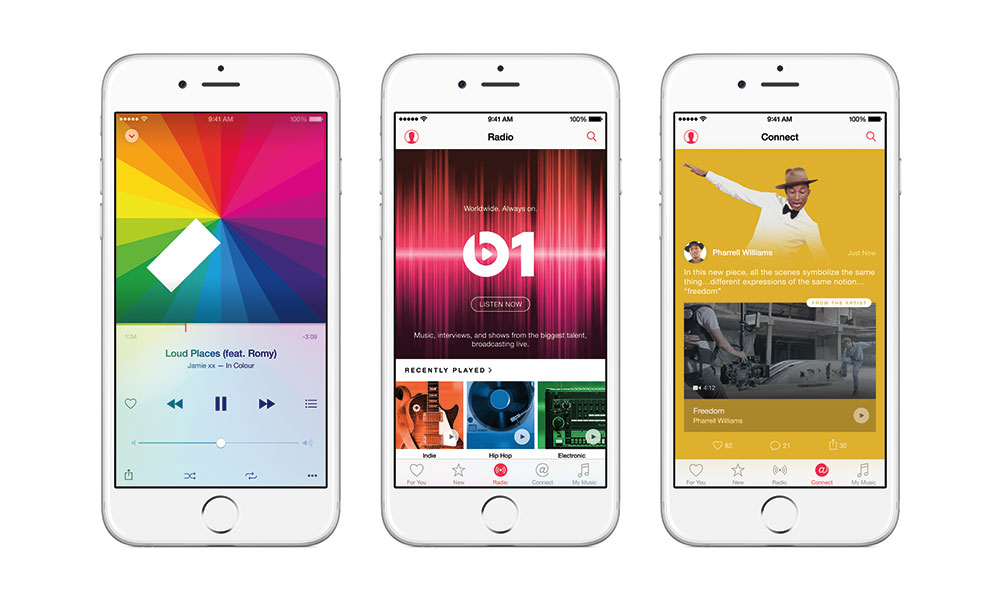
Controversial Apple Music Deal Rankles Indie Groups
Multiple trade groups representing independent musicians and labels have warned their members not to sign up for Apple's soon-to-launch streaming service. The reason? The contract lets Apple give away indie-label music for free over a three-month period.
Update: Since this story was published, a new notable critic of this policy surfaced—pop star Taylor Swift. And thanks to the additional pressure she brought to Apple over the issue, the company’s senior vice president of internet services and software, Eddie Cue, shifted course late Sunday night and said the company would pay royalties to artists during the trial period. See, Taylor Swift can basically do anything!
Apple has the market clout to play a little hardball with the music industry—something that has long contributed to its success with iTunes and the iPod, and even with its acquisition of Beats Music.
This time, however, Apple may have pushed indie labels a little too far, and that may mean a few favorites may be missing from the company’s upcoming streaming service.
It is surprising that Apple feels the need to give a free trial as Apple is a well-known entity, not a new entrant into the marketplace.
The American Association of Independent Music (A2IM), the trade group that represents indie record labels and artists, is advising its members not to sign a contract being offered by Apple ahead of the debut of Apple Music on June 30. That’s because the deal would allow Apple to give away A2IM members’ music for free for the first three months after the service launches.
“It is surprising that Apple feels the need to give a free trial, as Apple is a well-known entity, not a new entrant into the marketplace,” the association wrote in a blog post last week. “Since a sizable percentage of Apple’s most voracious music consumers are likely to initiate their free trials at launch, we are struggling to understand why rights holders would authorize their content on the service before October 1.”
On Wednesday, the group’s British counterpart, the Association of Independent Music, took a similar stance, noting that the contract put its members in a difficult spot.
“Essentially Apple is asking the independent music sector to hedge its risk, to fund their customer acquisition program, and to shoulder the financial burden for their global launch,” AIM CEO Alison Wenham wrote in a letter to members acquired by MusicWeek. “Apple has always been a valued partner to the music industry, but this decision to withhold income from the independent music sector is against the spirit of collaboration that we have come to expect from them.”
Little Time to Decide
Other aspects of the contract have also proven controversial. Billboard magazine notes there was some initial concern that the contract paid record labels only a 58 percent revenue share, though Apple later clarified that the share was closer to 72 percent. And other industry figures have complained that they’ve been forced to make a decision on the contract with just a few weeks’ notice.
However, the main issue appears to be the lengthy free trial, which provides zero compensation to labels and musicians. Already, the prominent indie label collective Beggars Group—which counts Adele, Future Island, Interpol, and St. Vincent among its many artists—has said it would not sign the contract in its current form.
Another trade group executive, UK Music Chairman Andy Heath, claimed the Apple Music deal could “literally put people out of business.”
“If you are running a small label on tight margins, you literally can’t afford to do this free-trial business,” he told The Telegraph. “Their plan is clearly to move people over from downloads, which is fine, but it will mean us losing those revenues for three months.”
This isn’t the first fight over royalty rates for indie-label groups. Around this time last year, the groups took YouTube to task over a controversial contract that led some artists to believe that their videos would be removed from the service entirely. The parties eventually reached a deal.
The biggest problem with Apple Music, indie labels say, is the lengthy free trial. (Handout photo)






Comments